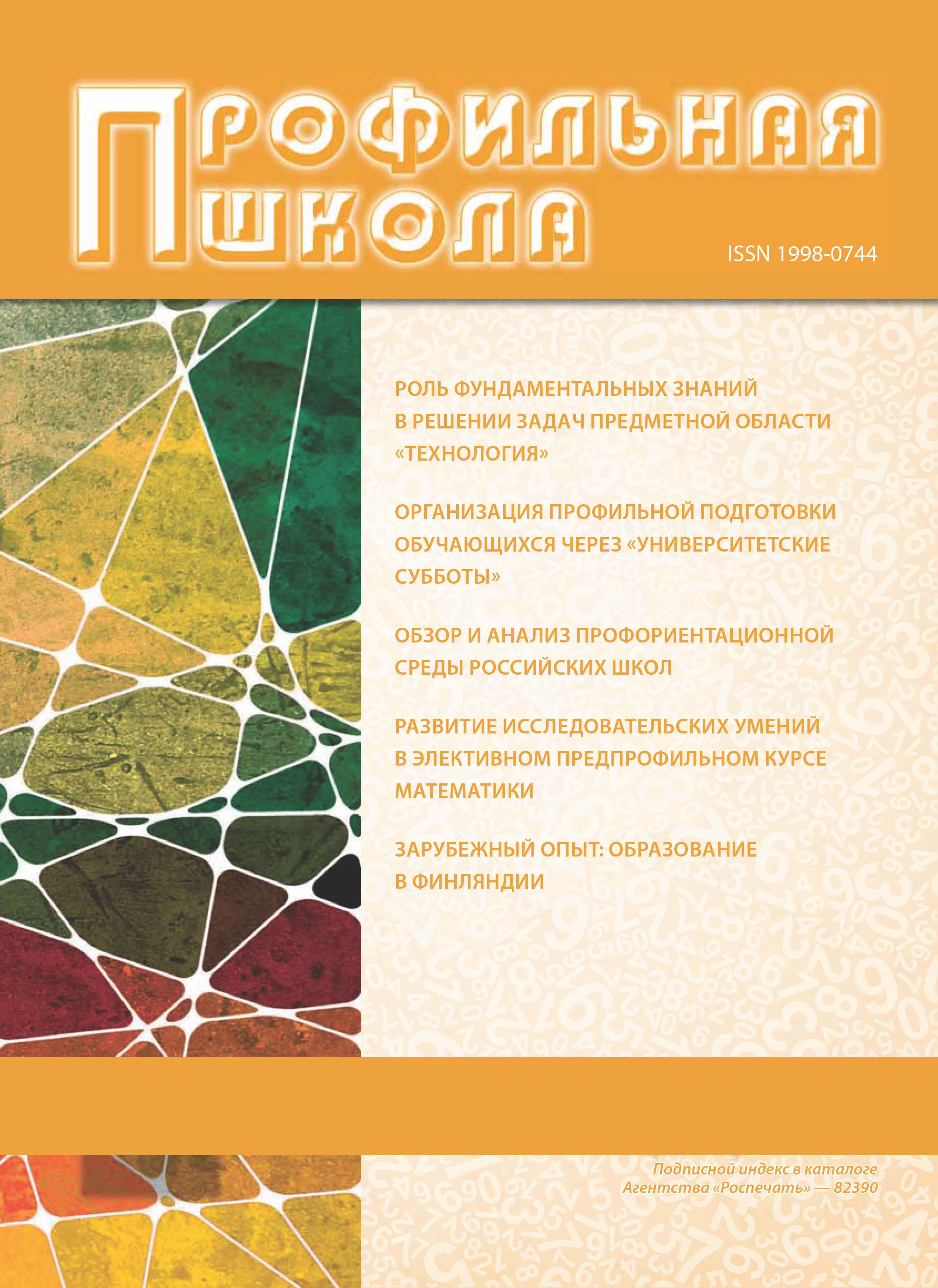g. Vladivostok, Vladivostok, Russian Federation
Vladivostok State University of Economics and Service
Vladivostok, Vladivostok, Russian Federation
UDK 37 Образование. Воспитание. Обучение. Организация досуга
GRNTI 14.25 Общеобразовательная школа. Педагогика общеобразовательной школы
OKSO 44.03.04 Профессиональное обучение (по отрослям)
BBK 7424 Организация общеобразовательной школы
TBK 3214 Методические пособия. Программы
The relevance of this problem research is conditioned on the intellectually trained teaching staff shortage and the complexity of organizing pre-professional teacher training in high school. The purpose of this article is to develop and test the program named "Intellect" for students of pedagogical specialized classes. The content of the program has an intellectual, emotional-value, communicative holistic impact on students: The leading research method for this problem was the questionnaire survey, that was conducted in 114 high school students and 13 teachers, which allowed to identify positive dynamics in high school students attitude to modern education and pedagogical activity. The article proves that an expanded psychological and pedagogical intelligence-based education can be the constructing successful life trajectories foundation for high school students The presented in the article research results indicate that the «Intellect» program implementation give rise to intellectual (cognitive) activity of high school students; pedagogical education professional preferences cultivation; activation of essential in the pedagogical field personal qualities of high school students; students self-development. Practical relevance of the research results is the ability to use the presented program to organize pedagogical oriented specialized classes.
intellectual education, cognitive activity, professional preferences in the field of pedagogical education, specialized classes
1. Vorovshchikov S.G., Novozhilova M.M. Shkola dolzhna uchit' myslit', proektirovat', issledovat': Upravlencheskij aspekt: Stranicy, napisannye konsul'tantom po upravleniyu i direktorom shkoly [The school must be taught to think, design, and research: Management Aspect: Pages written by a management consultant and principal]. Moscow: 5 za znaniya Publ., 2007. 352 p. EDN: https://elibrary.ru/LIUOON
2. Kravcov V.V., Savel'eva N.N. Intellektual'noe vospitanie uchashchihsya: ot teorii k praktike [Intellectual education of students: from theory to practice]. Vladivostok: Dal`ne-vost. federal. un-t Publ., 2018. EDN: https://elibrary.ru/YTHDKA
3. Popov A.A., Gluxov P.P., Lupa G.M., Popova O.A. Letnij obrazovatel'nyj otdyh v ramkah kompetentnostnogo podhoda: metodicheskoe posobie [Summer educational vacation in the framework of the competency-based approach: methodological manual]. Moscow: LENAND Publ., 2017. 192 p.
4. Nevzorov M.N. Pedagogicheskoe CHelovekovEdenie i pedagogicheskoe CHelovekovedenie. CHast' pervaya: Pedagogicheskoe CHelovekovEdenie - RADODAR [Pedagogical Humanity Part One: Pedagogical Man Eating - RADODAR]. Vladivostok: DVFU Publ., Vladivostok-Ussurijsk Publ., 2017. 201 p.
5. Popov A.A. Obrazovatel'nye programmy i elektivnye kursy kompetentnostnogo podhoda [Educational programs and elective courses of the competency-based approach]. Moscow: LENAND Publ., 2016. 344 p.
6. Ob utverzhdenii Koncepcii profil'nogo obucheniya na starshej stupeni obshchego obrazovaniya: prikaz Ministerstva obrazovaniya Ros. Federacii ot 18 iyulya 2002 g. № 2783 [On approval of the Concept of specialized education at the senior level of general education: order of the Ministry of Education of the Russian Federation. Federation of July 18, 2002 No. 2783].
7. Savel'eva N.N. Uchis' uchit'sya: modul'no-rejtingovaya programma dlya starsheklassnikov [Learn to study: a module-rating program for high school students]. Vladivostok, Dal`ne-vost. federal. un-t Publ., 2018.
8. Serikov V.V. Pedagogicheskaya real'nost' i pedagogicheskoe znanie. Opyt metodologicheskoj refleksii [Pedagogical reality and pedagogical knowledge. Experience of methodological reflection]. Moscow: Redakcionno-izdatel'skij dom Rossijskogo novogo universiteta Publ., 2018. 292 p.
9. SHlenev A.K. Pedagogicheskij klass kak sub"ekt vospitatel'noj sistemy shkoly. Kand. Diss [The pedagogical class as a subject of the educational system of the school. Cand. Diss] Yaroslavl 2000. 222 p. EDN: https://elibrary.ru/NLWOVD
10. Xolodnaya M.A. Psihologiya intellekta. Paradoksy issledovaniya [Psychology of intelligence. Paradoxes of research]. Moscow: YUrajt Publ., 2019. 334 p. EDN: https://elibrary.ru/YOZTUL






